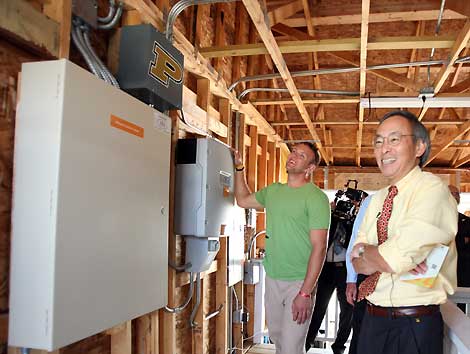
U.S. Energy Secretary Steven Chu speaks with student team member Jordan Wallpe, left, as he demonstrates the inverter system showcased in Purdue University's garage at the U.S. Department of Energy Solar Decathlon 2011 in Washington, D.C. this fall. (Credit: Stefano Paltera/U.S. Department of Energy Solar Decathlon)
Today's data center managers are striving to make their facilities "greener" and more cost-effective through the wiser use of power resources. This is boosting the demand for skilled professionals with experience in energy management who can optimize power usage in data centers as well as other commercial and non-profit facilities.
Global energy management specialist Schneider Electric recently announced a new effort to assist in building up this field through a university relations program.
“There is a sizable business opportunity in energy management today and the market will continue to grow,” said Jeff Drees, U.S. Country President, Schneider Electric. “We all need to get off the sideline and do our part to ensure there is a skilled workforce at many levels to sustain the demand for energy management solutions.” Schneider and similar companies need to lead the movement, Drees said, working in conjunction with the public sector and academia.
Bolstering Recruitment and Relationships
Cassie Quaintance, Schneider's Director of University Relations, said there are very few focused programs in four-year colleges preparing students for careers in energy management and renewable energy technologies. Schneider will be working closely with 10 universities, providing executive sponsorship, lending guest speakers to classrooms and seminars, and assisting in funding and equipping the creation of energy laboratories.
For example, the company has partnered with Texas A&M to establish a learning lab focused entirely on energy management. The lab will provide a hands-on opportunity for about 250 students majoring in industrial engineering to have experience with how energy management works in a building. In a project at Miami University of Ohio, Schneider donated $200,000 to study abroad programs in the school of business to assist in the creation of international business leaders.
This is a new focus for Schneider, according to Quaintance. "It will supplement our strong recruiting and strengthen our long-term relationship with universities,” she said in an interview.
Ongoing Challenge and Educational Opportunity
Another hands-on, ongoing program in which Schneider is an active sponsor is the the Solar Decathlon, a biannual competition by the U.S. Department of Energy (DOE). Teams of undergrads from around the globe design and build highly efficient, solar-powered homes. The students - who hail from a variety of majors such as engineering, architecture, design and communications - work together to create houses to be tested, judged and publicly displayed. This year's event held in the fall drew more than 350,000 people to view the houses set up in the National Mall’s West Potomac Park in Washington, D.C. The DOE is seeking a new location for the 2013 event.
Since 2002, the competition offers about 20 collegiate teams comprised of 100-plus students the opportunity to design, build and operate solar-powered houses that are cost-effective, energy-efficient and attractive. The 2011 winner was the University of Maryland team, who was determined to have achieved the best blending of affordability, consumer appeal and design excellence with optimal energy production and maximum efficiency.
Energy Management is Cross-Cutting
Just as the decathlon has students working in inter-disciplinary teams, the need for energy management skills cuts across many fields, says Quaintance. That includes students who major in mechanical, electrical and industrial engineering as well as the construction, architecture, business, finance and marketing fields. “There is no energy management degree that prepares one for a career,” she says. “We are targeting a variety of different disciplines.”
In the data center field, Quaintance notes that “it’s not just about racks and cooling anymore.” Increasingly, data center managers are taking a holistic approach and asking “How does energy fit in?” she added.
“We’re excited about and committed to serving the universities in the U.S. and globally," said Quaintance. "We will be looking to hire graduates who are passionate about energy management. We’re proud to be part of it.”




